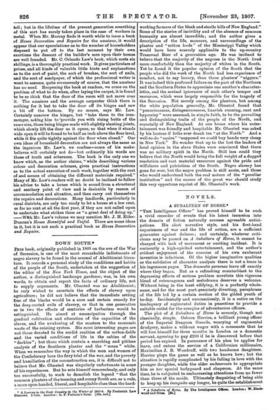DOWN SOUTH.* THis book, originally published in 1860 on the
eve of the War of Secession, is one of the most remarkable indictments of negro slavery to be found in the arsenal of Abolitionist litera- ture. It records a personal study of the conditions and habits of the people of the South, undertaken at the suggestion of the editor of the New York Times, and the object of the author, a distinguished landscape gardener, was, in his own words, to obtain and report the facts of ordinary life, not to supply arguments. Mr. Olmsted was no Abolitionist; he only wished to ascertain the effects of slavery upon agriculture ; he did not believe that the immediate setting free of the blacks would be a sure and certain remedy for the deep-rooted evils of slavery, or that in one generation or in two the effects of centuries of barbarism would be extinguished. He aimed at emancipation through the gradual cultivation and education of the capacities of the slaves, and the awakening of the masters to the economic waste of the existing system. His most interesting pages are not those devoted to the sordid realities of the cotton-fields and the varied conditions of life in the cabins of the " darkies " ; but those which contain a searching and pitiless analysis of the Southern planter and the " mean " white. When we remember the way in which the men and women of the Confederacy bore the fiery trial of the war, and the poverty and humiliation of the reconstruction era, it is difficult not to believe that Mr. Olmsted was singularly unfortunate in some of his experiences. But he sets himself remorselessly, and only too successfully, to work to demolish the legend "that the common planters of the teeming and sunny South are, as a rule, a more open-handed, liberal, and hospitable class than the hard-
• A Journey in the Back Country in the Winter, f 18534. By Frederick Law Olmsted. 2 vole. London : G. P. Putnam's Sons. [250. net.]
working farmers of the bleak and sterile hills of New England." Some of the stories of incivility and of the absence of common humanity are almost incredible ; and the author gives a description of the life, manners, and surroundings of the planter and " cotton lords " of the Mississippi Valley which would have been scarcely applicable to the up-country Transvaal Boer of a generation ago. He was inclined to believe that the majority of the negroes in the North lived more comfortably than the majority of whites in the South. Yet he found it the popular opinion of the South that the people who did the work of the North had less experience of comfort, not to say luxury, than these planters' "niggers." It was indeed this profound failure on the part of the Northern and the Southern States to appreciate one another's character- istics, and the mutual ignorance of each other's temper and resources, which were largely responsible for the tragedy of the Secession. Not merely among the planters, but among the white population generally, Mr. Olmsted found that "penuriousness, disingenuousness, knavish cunning, cant and hypocrisy" were assumed, in simple faith, to be the prevailing and distinguishing traits of the people of the North, and especially of New England. At one house where his enter- tainment was friendly and hospitable Mr. Olmsted was asked by his hostess if folks ever drank tea " at the North." And a well-to-do "squire" "supposed we could buy bands very cheap in New York." No wonder that up to the last the leaders of local opinion in the slave States were convinced that there was no military spirit in the North. Still less could they believe that the North would bring the fall weight of a dogged resolution and vast material resources against the pride and wilfulness and patriotism of the South. Negro slavery has gone for ever, but the negro problem is still acute, and those who would understand both the real nature of the "peculiar institution" and the causes of the great war should study this very opportune reprint of Mr. Olmsted's work.


















































 Previous page
Previous page